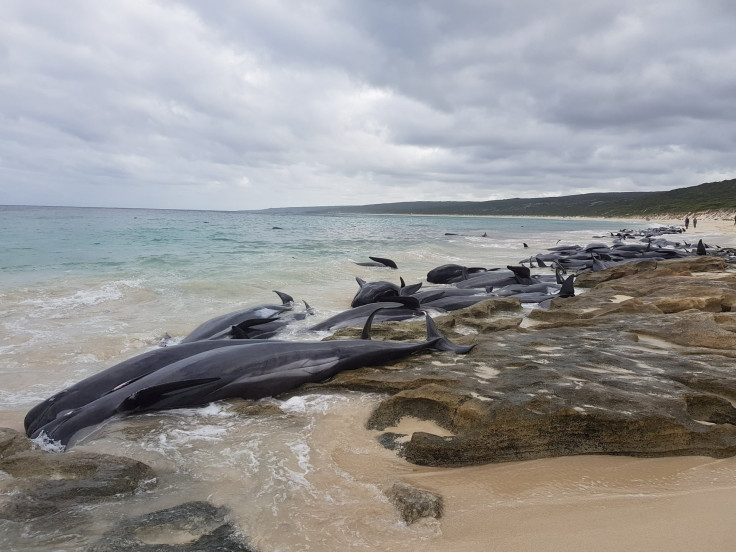Over 150 Pilot Whales Beached In Australia, Only 15 Alive [Photos, Video]
More than 150 pilot whales were stranded on Western Australia’s southwest coast, leading to deaths of most of the cetaceans on Friday in what was one of largest mass beachings in recent history.
According to the latest update from Parks and Wildlife, parks and business development coordinator Ben Tannock said only 15 of the whales could be saved, as trained volunteers and specialist staff from Parks and Wildlife and Sea Search and Rescue tried to quickly get as many whales as they could into deep water.
Rescue operation is underway to save over 150 short finned pilot whales that are stranded on a beach in Western Australia https://t.co/HV9MeG8GUA pic.twitter.com/zlcIBTBhD2
— China Xinhua News (@XHNews) March 23, 2018
"It's one of the mysteries of nature," he said, the Sydney Morning Herald reported. "Hopefully we can save as many as we can, but once they come ashore like that they do deteriorate quite quickly."
A fisherman first noticed the mass of short-finned pilot whales stranded on the beach at 6 a.m. Friday (3 p.m. EDT, Thursday) 315 kilometers (195 miles) south of Perth, and alerted the authorities. By the time wildlife officials got to the scene and closed down the nearby beaches, 75 whales had already died.
"Most of the whales beached themselves on dry land overnight and have not survived," said incident controller Jeremy Chick. "The strength of the animals and the windy and possibly wet weather conditions will affect when and where we attempt to move them out to sea. The main objectives are to ensure the safety of staff and volunteers as well as the whales' greatest chance of survival."
The Department of Primary Industries and Regional Development issued a shark advice for Hamelin Bay beach, which was closed for the public, following the discovery of the whales. People were warned to avoid the area.
“It is possible the dead and dying animals will act as an attractant, which could lead to sharks coming close into shore along this stretch of coast,” the department said, the Strait Times reported. “While it’s not uncommon for sharks to be present off the WA coast throughout the year, people should exercise additional caution until the stranding incident is resolved.”
Marine biologists were unable to determine why the pilot whales, who inhabit tropical and subtropical waters, beach themselves in hundreds sometimes.
According to senior marine operations officer for Parks and Wildlife John Edwards, some of the speculated reasons behind whale beachings are changing water temperature, lightning strikes, or the sickness of an animal in the pod. “They can lead to the inability of an animal to work out gradients in the water,” Edwards told the Australian.
The particular shape of the coastline also might be a contributing factor. Wildlife researchers have also explored theories such as whales responding to distress calls from other whales, or groups following a leader to their death.
The largest whale beaching in West Australia recorded was in 1996, when 320 long-finned pilot whales swam ashore, at Dunsborough. Despite extensive efforts from wildlife volunteers, only 20 whales managed to make back into the waters alive.
In 2009, 72 long-finned whales and a dolphin died at Hamelin Bay despite rescue attempts by volunteers.

© Copyright IBTimes 2024. All rights reserved.






















